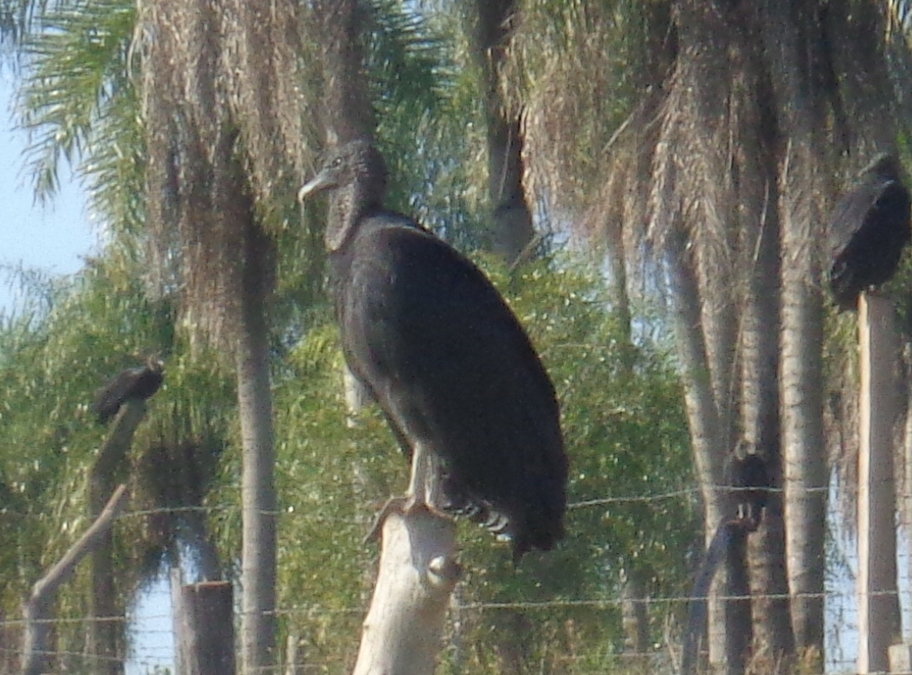There are a number of species of vulture to be seen across Paraguay. Amongst these are the Turkey Vulture and the Lesser Yellow Headed Vulture. However the most common and widespread is the Black Vulture. Coragyps Atratus.
The Black Vulture is a large and highly visible bird. It is not though the largest of vultures. It stands 50cm tall with a wingspan of 1.5 metres. This along with its bulk still make it the largest bird around.
As the name suggest the Black Vulture is just that. Apart from a white patch under the wing which is only visible in flight the birds are uniformly black. In common with all vultures not only are the legs featherless but so is the head. The head is like the feathers black. Seen close up skin on the birds head appears loose and wrinkled.
A naked head is an adaption to the preferred feeding method the Black Vulture adopts in common with other vultures. It is on the whole a consumer of carrion. Its powerful beak used to rip and tear at its meal. any feathers it were to have on the head would very soon become matted and unhygienic.
The Black Vulture is a creature of the open country but has little fear of man and so will settle in habituated areas with ease. There it can become a nuisance raiding rubbish dumps and even attacking young or infirm livestock.
Black Vultures are gregarious. They live in large groups and travel in flocks. As such when carrion is found and a flock of vultures descends upon it the carcass is quickly stripped bare. Hunting in packs they have little difficulty stealing prey from a Turkey Vulture or an eagle by weight of numbers.
The flock will roost together high up in rocks in in the branches of a large tree. Nests a little more than scrapes in the ground. Generally these are high up on cliffs. Either on ledges or in caves. The eggs of which two is the most common number are laid directly onto the ground.
The birds have keen eyes sight enabling them to spot carrion from high about. Then additionally their sense of smell is sharp and the odour of a large meal will attract all the vultures in the surrounding area.
To conserve energy whist in flight in search of a meal Black Vultures glide as much as possible. They pick up the heat of a rising thermal and spiral round and round in it to great heights. So high that at several thousand feet up they become little more than black dots amongst the clouds. Even with their eyesight there is little chance of spotting a meal from that high up.
Whist being great gliders they cannot fly that way indefinitely. Compared with other vultures their wings are actually quite short. So they must resort to flapping their wings. This uses more energy than gliding but they are swift and strong fliers.
Lacking vocal cords this in almost the only time the vultures make any noise. Powerful wing beats can be heard on the ground. Additionally when two birds are jousting in the air they may emit grunts and hisses. Sounds more suited to their appearance than gentle bird song.
On the whole a flock of vultures is sedentary. Living and hunting within its territory. These flocks can be in excess of fifty birds. As such they require sizable home ranges. A large flock of local vultures is a good indicator of a healthy environment. One where there is sufficient food all the way up the food chain.
Some flocks though are migratory. From time to time I see these vast clouds of vultures spiraling up in the thermals. Slowly they pass from horizon to horizon heading from one range to another.
On all but wet and windy days vultures are up on the wing. Everyday I see large numbers of them. Spiraling up on hot air or heading between the rocks behind the house and hills in front. Unless there is carrion to be found they never descend to the ground staying instead up above from where they can look out across the land below.
In the towns and cities they are as much as common sight as here in the countryside. However their numbers are fewer and flocks appear to be smaller. This would reflect the reduced feeding opportunities built up area provide.
There are no such problems for vultures in the countryside. The large shadows they cast and the sound of their wing beats constant reminders of their presence.


Recent Comments